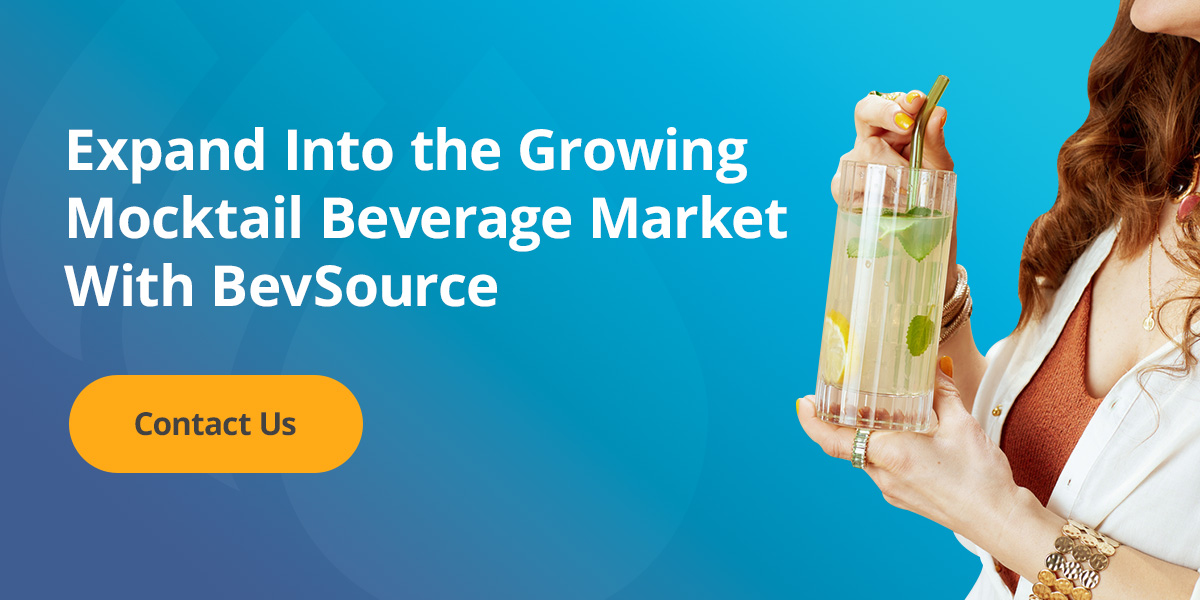Crafting Nonalcoholic Beverage Options
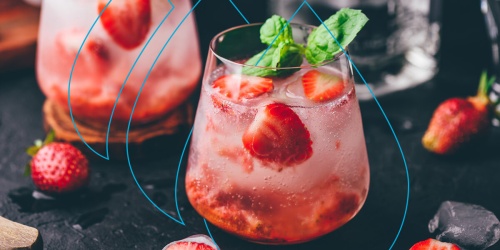
Consumers' attitudes toward alcohol are changing, and the mocktail market is seeing significant growth. Many health-conscious consumers are consuming less alcohol and experimenting with alcohol-free alternatives to meet their social needs while avoiding the risks and side effects associated with alcohol consumption. This shift reflects a cultural movement toward healthy living and mindful consumption. Beverage brands should adapt and meet consumer preferences to stay relevant in an evolving market.
Whatever consumers' motivations for changing their drinking habits, beverage brands have responded in kind. With a diverse collection of options available, consumers can find the nonalcoholic alternative that meets their needs.
The Shifting Drinking Culture
The ready-to-drink (RTD) mocktail market size was $8.26 billion in 2023 and is growing at an exponential rate. According to Statista, off-premise nonalcoholic drink sales reached $509.6 million in the United States in 2023 alone.
Along with zero-alcohol beverages, the nonalcoholic drink market includes beverages with low alcohol by volume (ABV) measurements that mimic traditional alcoholic production processes. For example, beer with less than 0.5% ABV is considered nonalcoholic. Although nonalcoholic beer is a mainstay of the nonalcoholic market, ready-to-drink mocktails — that is, nonalcoholic versions of cocktails — are quickly gaining popularity. The question is, why?
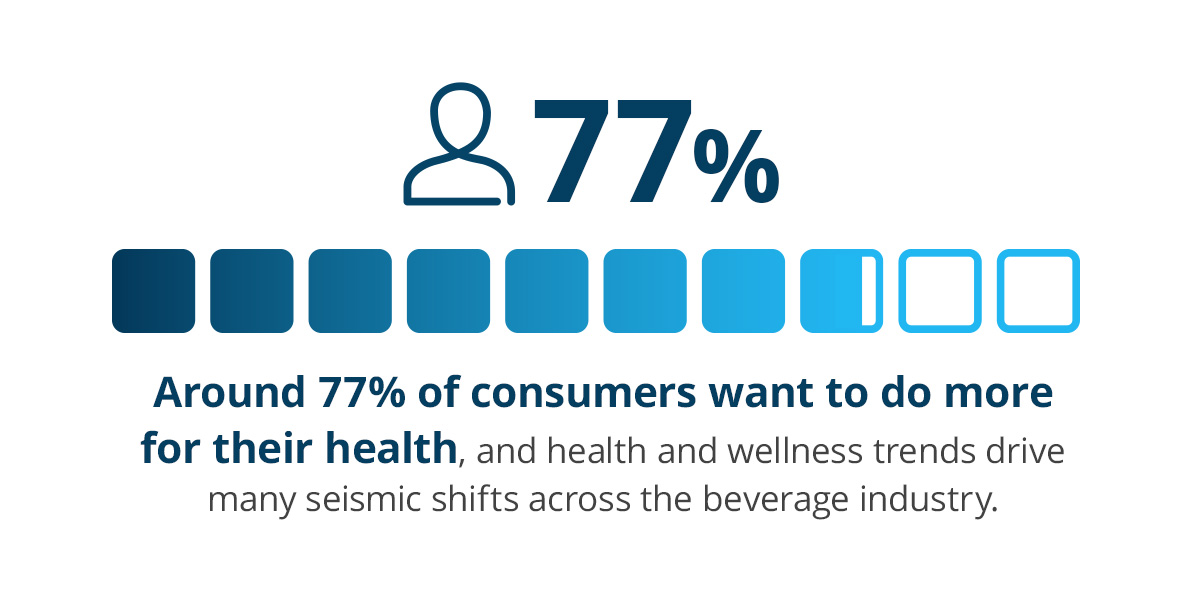
A broader societal shift toward health consciousness is partly behind the change. Around 77% of consumers want to do more for their health, and health and wellness trends drive many seismic shifts across the beverage industry. The change in drinking culture is also generational. Gen-Z, on average, drinks 20% less than millennials, and 86% of Gen-Z believe their mental health is as important as their physical health when making alcohol-related choices.
Some key drivers behind the shifting drinking culture include:
- Moderation of consumption: Even people who consume alcohol are drinking less. Demographic changes, evolving social norms and the increasing availability of nonalcoholic alternatives are giving people more of a choice.
- Health and wellness concerns: Consumers are more aware of what they put in their bodies. They're aware of the adverse effects of alcohol and want to focus instead on functional beverages and clean labels. When they do drink alcohol, they often reach for "better-for-you" alternatives, such as spirit-based seltzers with fewer calories and more natural ingredients.
- Inflation: The price of alcohol has risen dramatically since 2000, and some consumers are shifting to less costly alternatives. General inflation also influences purchase choices and leads to many consumers limiting celebratory spending.
- Premium alternatives: Many consumer groups are opting for higher-quality choices but less ABV, pushing nonalcoholic alternatives to the forefront.
- CBD beverage alternatives: Cannabinoid (CBD) mocktails are a growing trend among consumers. CBD has many potential health benefits, like reduced stress, better sleep and decreased pain. Since the Agriculture Improvement Act legalized the production and sale of industrial hemp in 2018, the CBD market has experienced explosive growth. CBD-infused beverages are yet another alternative for consumers who choose to avoid alcohol.
- Socialization: Many consumers still want to enjoy the social experience of having a drink with friends but without alcohol. Nonalcoholic beverages like mocktails have a higher social acceptance rate than ever, allowing consumers to enjoy the same social activities without the side effects.
Understanding the Target Market for Nonalcoholic Beverages
Any brand looking to disrupt the mocktail market must understand its target audience. One of the most exciting things about nonalcoholic beverages is that they appeal to multiple target markets. Following are some of the primary target demographics for mocktails and other nonalcoholic beverages.
Gen-Z
In less than a decade, even the youngest Gen-Zers will be of drinking age in the U.S. However, many members of this generation are drinking less or abstaining from alcohol completely. An increased awareness of alcohol's dangers and effects has transformed the way Gen-Z interacts with these products. It's also important to keep in mind that the decrease in alcohol use by Gen-Zers has seemingly coincided with an increase in cannabis use.
Millennials
Millennials are another generation your brand can target with mocktails. In April 2023, millennials accounted for 61% of nonalcoholic beer consumers in the United States. They are also feeling more at ease with their financial situations, which has led to more socialization and driven consumption. More occasions to hang out with friends and family have led many to explore the no-alcohol market. Millennials also often participate in movements like "Dry January" and "Sober October," which fuels their desire to explore mocktails and other nonalcoholic beverages.
Health-Conscious Consumers
Consumers across generations are paying more attention to their health, leading to an increased demand for low- and nonalcoholic beverages. People want drinks that fit into a healthier lifestyle, and beverage brands are meeting these demands. Mocktails can provide health benefits when formulated with fruit and other natural ingredients, providing more options for consumers focused on their health.
Ethical and sustainable consumption are often critical factors for health-conscious consumers. They prefer natural, locally sourced and sustainable alternatives — yet another opportunity for mocktails to meet multiple consumer demands. Mental health is also becoming a regular topic for discussion. Consumers are more open about their relationships with alcohol and take a mindful approach to consumption.
The Art of Crafting Mocktails and Adult Nonalcoholic Beverages
In all their popularity, mocktails face a watershed moment in the market. They can take one of two paths. The first version of the mocktail is the traditional one — a nonalcoholic version of traditional cocktails. The second path takes mocktails further by including functional ingredients that appeal to a more "adult" consumer.
These beverages seek to mimic the cocktail experience, replacing alcohol with nootropics, adaptogens, CBD or tetrahydrocannabinol (THC). These functional ingredients allow consumers to enjoy their cocktails without feeling the effects the next day. Here are some of the many ways your brand can craft mocktails and adult nonalcoholic beverages.
Focus on Flavor
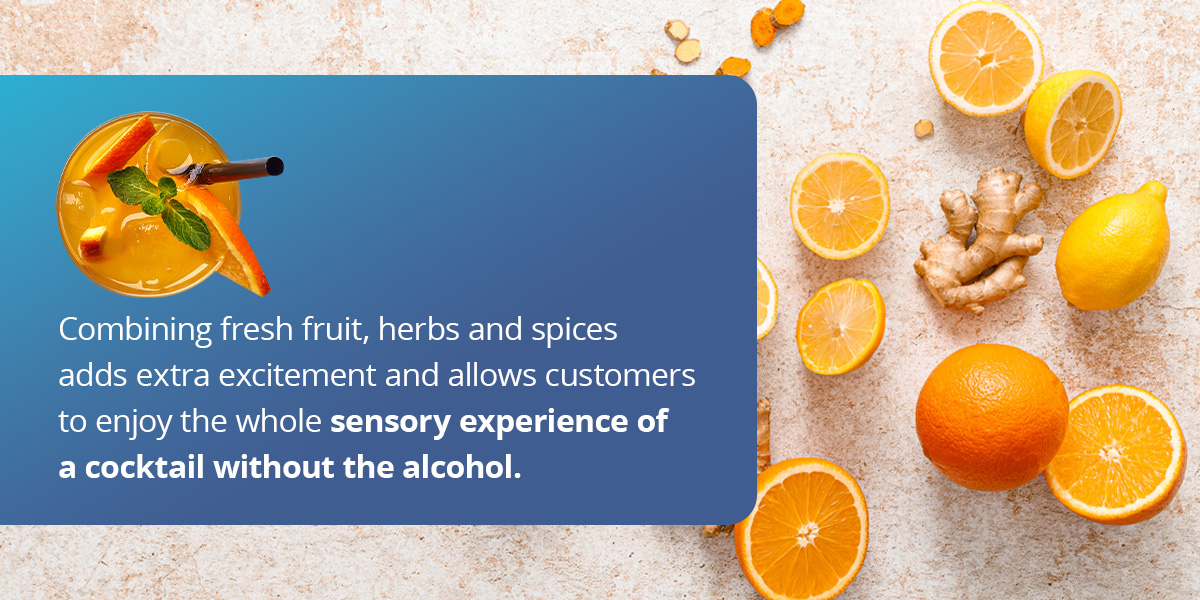
Flavor is a primary driver for consumers choosing nonalcoholic beverages. It's one of the first things they look for. Consumers seek explosive and exciting flavors, and they want novelty and adventure. Combining fresh fruit, herbs and spices adds extra excitement and allows customers to enjoy the whole sensory experience of a cocktail without the alcohol.
RTD mocktails allow beverage brands to think outside the box. Unique pairings keep consumers interested — think chili watermelon or ginger hibiscus. Adding herbs and floral flavors adds an element of sophistication that appeals to consumers. If they're willing to spend money on mocktails, they want the full experience.
Experiment With Innovative Production Methods
As mocktails have evolved, production methods have become more creative. Beverage brands can appeal to consumer perceptions of sophistication with innovative and captivating production methods. For example, smoking can add depth and complexity to RTD mocktails. Integrating smoking processes into your production adds a rich complexity reminiscent of traditional cocktails.
Infusions allow consumers to explore a range of natural flavors, meeting their demands for natural ingredients and clean labels. By infusing mocktails with herbs, spices and fruits, you can develop unique flavors that refresh and entice your target audience. Experiment with unexpected ingredients to find the sweet spot for consumers.
Carbonation is another method for creating the mouthfeel and overall experience consumers expect. Sparkling mocktails mimic the effervescence of traditional cocktails and add a celebratory feel.
Integrate Functional Elements for Health-Conscious Consumers
Adult nonalcoholic beverages are an ideal delivery system for functional ingredients. Consumers can prioritize their health while still enjoying the social aspect associated with traditional cocktails.
For example, adaptogens and nootropics can help consumers focus, manage stress and increase their energy levels. In a landscape where consumers are asking what beverages can do for them, adding the following functional ingredients can answer their questions:
- Branch-chain amino acids (BCAAs): BCAAs can help support muscle recovery and boost stamina. They can also improve muscle growth, making them popular among health and fitness enthusiasts.
- Ginseng: Research suggests this root offers several functional benefits, including supporting brain health and immune function.
- Valerian root: Valerian root is a herb with sedative properties. It may reduce feelings of anxiety and promote a sense of calm.
- Reishi: Reishi mushroom is an adaptogen known for its purported immune-boosting properties and ability to reduce fatigue.
- Ashwagandha: This shrub is an adaptogen that may increase resilience to stress and improve immune responses.
- Lion's mane: This mushroom is touted for its potential effects on cognitive functioning and focus. It may also help boost immune systems.
- Citrus and tropical fruit: These vitamin and antioxidant powerhouses can help reduce fatigue, support heart health and aid in weight loss.
- L-theanine: This amino acid impacts nerve impulses in the brain, potentially creating a calm focus.
Branding and Marketing Strategies for Beverage Brands
One of the primary challenges for beverage brands entering the mocktail market is gaining traction with consumers. You'll want a strategy to differentiate yourself from competitors. The following tips and tricks can help your beverage stand out in a crowded space.
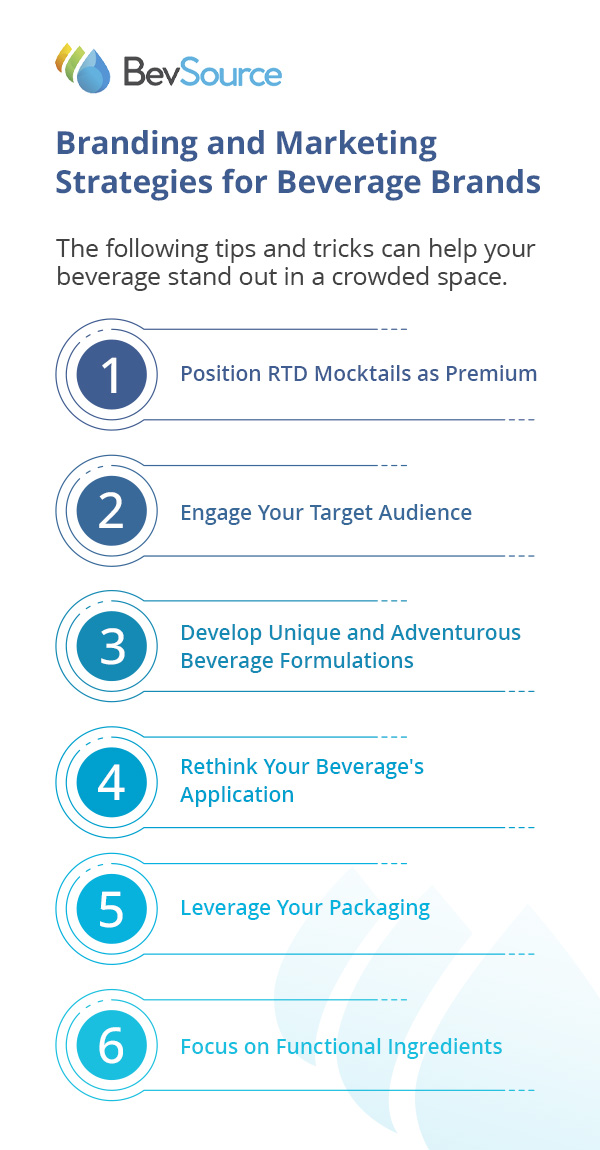
Position RTD Mocktails as Premium
The growth of craft beverages proves that premium offerings resonate with consumers. They gravitate toward high-quality ingredients, small batches and artisanal techniques. Innovative flavors and minimalist packaging are trending as consumers seek a bespoke option that meets their individual needs.
Engage Your Target Audience
Consumers want to feel good about their purchases and are drawn to brands they trust. Delivering innovative nonalcoholic options can build that trust, and making consumers part of your narrative is essential. The better you know what resonates with your audience, the more effectively you can provide it.
Ask them what matters to them, and tell a story about your brand that connects with their values, whether it's about local sourcing, premium ingredients or a social experience. Make your story authentic and relatable to help consumers connect with your brand.
Develop Unique and Adventurous Beverage Formulations
Novelty is crucial in a rapidly expanding market. Consumers want new ingredients and formulations that keep them guessing. Mocktails let you develop flavors as diverse and complex as traditional cocktails. Tropical fruits are exploding on the beverage scene, and brands are already pairing them with unique herbs, spices and botanicals. Fill your mocktail with unique and exotic flavor profiles and vibrant colors to stand out on the shelves.
Rethink Your Beverage's Application
Trends in how consumers enjoy their mocktails are changing. As consumers push the boundaries of possibility, we'll likely see functional mixology kits for home use and on-premise expertise. Consider whether you can rethink your beverage delivery system to meet these needs. For example, you could deconstruct it to allow consumers to mix it at home.
Leverage Your Packaging
Consumers are paying more attention to beverage packaging and want to align with brands on sustainability values. Consider sustainable packaging solutions for your beverage. A massive 78% of consumers say that living a sustainable lifestyle matters to them, and you can reflect those values through your packaging and sourcing practices. Packaging design can also help you stand out to consumers. Minimalist designs fit their needs for sophistication and align with their natural and sustainable objectives.
Focus on Functional Ingredients
Many consumers reach for nonalcoholic beverages for health reasons. In some cases, the absence of alcohol is enough to satisfy them, but adult nonalcoholic beverages are also a vehicle for introducing functional ingredients. You can focus on vitamins or enhance the consumer experience with CBD, adaptogens and nootropics. These additions allow consumers to fulfill multiple health and social requirements with a single beverage. Focus on wellness positioning in your marketing efforts to keep your brand at the top of consumers' minds.
Mocktail Culture and Consumer Demand
Consumers want more than the classic, sugary cocktail alternatives of the past. They want clean options with high-quality ingredients. Enter the mocktail. From RTD options to freshly created beverages in bars, the mocktail trend is here to stay. The last decade or more of thriving cocktail culture has set the stage for the creativity at the heart of the mocktail movement. Mocktails are a popular alternative for many, and brands are developing beverages with more complex recipes and exotic ingredients.
Mocktails and other nonalcoholic drinks present some unique challenges for beverage brands. In response to the increased demand, more options are entering the market. Formulation challenges also require consideration. It can be challenging to replicate the familiar taste and "kick" of alcohol. Although nonalcoholic beverages cost around the same as alcoholic beverages to produce, development costs can be higher. It can be a process of trial and error before you're ready to market.
The RTD segment is inspiring for beverage brands. RTD mocktails cater to occasions where consumers want to unwind and slow down, and convenience continues to influence purchase patterns. The rise of e-commerce means consumers can enjoy traditional cocktail flavors without heading out to the bar or restaurant. As more channels support more sales, and premiumization knows no bounds, your brand can experiment with new RTD formulations amid a growing market.
Expand Into the Growing Mocktail Beverage Market With BevSource
Mocktails offers an exciting opportunity for your beverage brand to get creative with ingredients and enter a growing market. If you have a standout mocktail idea, BevSource can help you turn it into reality. As an integrated beverage development, sourcing and production solutions provider, we have the insight and experience to make it happen. We will support you from proof of concept to the finished product.
Leverage more than 20 years of beverage development and operations experience to shorten your time to market and access a network of vendors and suppliers. Get in touch with a beverage development specialist now and bring your mocktail concept to life!
